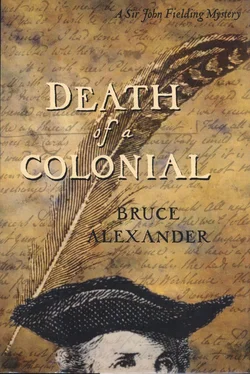Bruce Alexander - Death of a Colonial
Здесь есть возможность читать онлайн «Bruce Alexander - Death of a Colonial» весь текст электронной книги совершенно бесплатно (целиком полную версию без сокращений). В некоторых случаях можно слушать аудио, скачать через торрент в формате fb2 и присутствует краткое содержание. Год выпуска: 1999, ISBN: 1999, Издательство: Putnam Adult, Жанр: Исторический детектив, на английском языке. Описание произведения, (предисловие) а так же отзывы посетителей доступны на портале библиотеки ЛибКат.
- Название:Death of a Colonial
- Автор:
- Издательство:Putnam Adult
- Жанр:
- Год:1999
- ISBN:9780425177020
- Рейтинг книги:3 / 5. Голосов: 1
-
Избранное:Добавить в избранное
- Отзывы:
-
Ваша оценка:
- 60
- 1
- 2
- 3
- 4
- 5
Death of a Colonial: краткое содержание, описание и аннотация
Предлагаем к чтению аннотацию, описание, краткое содержание или предисловие (зависит от того, что написал сам автор книги «Death of a Colonial»). Если вы не нашли необходимую информацию о книге — напишите в комментариях, мы постараемся отыскать её.
Death of a Colonial — читать онлайн бесплатно полную книгу (весь текст) целиком
Ниже представлен текст книги, разбитый по страницам. Система сохранения места последней прочитанной страницы, позволяет с удобством читать онлайн бесплатно книгу «Death of a Colonial», без необходимости каждый раз заново искать на чём Вы остановились. Поставьте закладку, и сможете в любой момент перейти на страницу, на которой закончили чтение.
Интервал:
Закладка:
“What then?” said I to him. “Going so soon?” (Lord Mansfield had barely cleared the door.)
“I must,” said he. “My uncle has to hear of this. My God! The Solicitor-General! There will be a terrible scandal!”
And with that, he rushed off. Nor was he the only one to make a swift departure. When I looked around me, I saw that the journalists who had sat in the row ahead of me were now all gone, unwilling to wait for the finding of the jury. For them, as with Mr. Talley, the true significance of these proceedings was not Mr. Mobley’s fate, but, rather, the shadow of scandal that now fell upon one of power at court.
I thought to walk about a bit and loosen up, having sat in an attitude of strict attention for some time. But I had done no more than get to my feet, when all were bidden to rise the return of judge, prisoner, and jury. I had never known a jury to take so short a time to return with a verdict. One of them stood, and Lord Mansfield asked him how they had found.
“We find Percival Mobley, defendant, not guilty of ‘no murder by reason of self-defense’ And no manslaughter, neither. And we hope we got the words right.”
“The words are right enough. The jury is dismissed with our thanks.” He turned to the dock. “Percival Mobley, you are free to go. My advice to you is to return to the North American colonies. There are those in England who would want to take revenge upon you for certain revelations made in your statement.”
“1 shall do that, my lord.”
Then did the Lord Chief Justice slam down his gavel and end that day’s session of the court. As soon as he himself had disappeared, a whole section of those seated in the rows nearest the front went quite mad with joy. They ran up to the dock and pulled him to them. They, I later learned, were friends and family from Southwark, Sir John had got word to them of the trial, and a goodly number had come across the river to give support. The courtroom, in fact, was in a fair transport of joy — except for one man whom I saw slipping out one of the back doors of the courtroom. He was none other than Sir Patrick Spenser. His face was set so dark, his expression so angry, that I believe that if he had been armed, he would have walked up to Mr. Mobley and shot him down on the spot, consequences be damned.
“Well, Jeremy, are you ready to return to Bow Street? I feel that a walk is in order, don’t you?”
It was Sir John, of course. He was cheered by the outcome of the trial, of course. Yet, most of all, he seemed relieved that this matter of the Laningham claimant was now over and done. All this I gathered in the course of our amble back to Number 4 Bow Street. I told him as we set out that I had many questions for him. He replied that he feared they would have to wait.
“Give me a day or two,” said he, “that I may cleanse myself of this ugly business.”
As it happened, it was near a week before he was ready to speak freely of the matter. After dinner one night, I managed to entice him into such a discussion with news I had just heard from Mr. Baker below. I found Sir John where I expected to find him — in that small room between the bedrooms which he called his study. He was settled there behind his desk, sitting in the dark, when I knocked upon the open door. He invited me in.
“I thought you would be interested to know,” I said to him, “that I had just heard that Sir Patrick Spenser has been forcibly retired from his post as Solicitor-General.”
“And who replaces him?”
“A Sir Thomas Dexter.”
“Another courtier — no better, no worse.”
“Sir John,” said I, “you indicated after the trial that you might answer a question or two about the matter once you had had a few days’ rest from it.”
“Yes, I did.”
“Well, a few days have passed.”
“So they have. You may ask me what you like. I shall try to answer.”
There was one question I had been saving for this occasion. I hoped that I might phrase it in such a way as to make it interesting to him. If he were interested, he gave interesting answers in return.
“You will recall, sir, that when you gave testimony in behalf of Mr. Mobley during his trial, all went well until the very end. “
“You’re right, indeed you are.”
“Then he put a question to you — something on the order of ‘Do you believe what I said in my statement?’ “
“Yes, I recall.”
“Then you told him that by and large you accepted it — for instance, you accepted all that had to do with the death of Eli Bolt. But then, because he asked, you said that you were less willing to accept him as an unwilling participant in the Laningham conspiracy. Now, during all that, something went wrong between you. He seemed quite shocked at what you had said. Could you explain that to me?”
“That I shall do gladly, for therein lies a good lawyerly lesson for you. You were sent away the day before the trial, when Lord Mansfield and I began to work with Mr. Mobley to help him prepare his defense.”
“Oh, I remember. I felt quite like a child who had been sent out of the room so the adults might speak of adult matters.”
“Well, I offered to testify,” said Sir John. “My testimony and the statement he read out in court were the essence of his defense. He and I drilled his interrogation of me for two hours or more. You might say we prepared a script. I knew what he would ask and when he would ask it. Mobley was something of an actor. He played the role of a lawyer during the trial, reading the statement from the dock, and then questioning me according to the script we had worked out between us. An actor needs a script. But more often than not — or so I hear from Mr. Garrick — they like to stray from it, to improvise a little. Those questions that you noticed at the end of his interrogation were his improvisations, his deviations from the script we had prepared. When he did not get from me the answers that he expected or hoped he would get, then he was quite disappointed. But I could not lie for the fellow. “
“Even crestfallen as he was.”
“Yes, well, the lesson for you as a lawyer in all this is that you must drill your witnesses very well, so well that you know the answer to every question you ask. Or to put it as a principle of interrogation: Never ask a question to which you do not know in advance the answer you will receive.”
“I shall remember that, sir.”
“See that you do.”
There was silence between us for a short time, Sir John liked the silence better than I did. I wished to coax more from him. Perhaps, I thought, this question might capture his interest: “Sir John, I understand well enough what happened involving Sir Patrick Spenser in the false claim for the Laningham title and estate, but it is not clear to me what happened eight years ago. I accept it that Bolt did then murder the man in the Globe and Anchor — but why? I accept it also that Sir Patrick financed the expedition described by Paltrow in his Journal, but what was the purpose of the expedition? The discovery of gold? If so, was gold discovered? I have heard of no such finding in our North American colonies.”
“Nor are you likely to until Sir Patrick gains title to the land where the gold may be dug from the ground. I’ve made inquiries. He has made a discreet offer, yet perhaps not sufficiently discreet, for the proprietors have been set wondering what is in or on that mountainous land to interest one such as Sir Patrick.”
“Gold was the cause of all this?”
“Oh, not all of it, I suppose. Greed for land and higher position also played a part in this later conspiracy. It is remarkable to me, Jeremy, how little content some men are with what they have been given — and by that I mean men who have been given a great deal. In truth, it seems that with some, the more they have, the less satisfied they are — indeed, the more they want.”
Читать дальшеИнтервал:
Закладка:
Похожие книги на «Death of a Colonial»
Представляем Вашему вниманию похожие книги на «Death of a Colonial» списком для выбора. Мы отобрали схожую по названию и смыслу литературу в надежде предоставить читателям больше вариантов отыскать новые, интересные, ещё непрочитанные произведения.
Обсуждение, отзывы о книге «Death of a Colonial» и просто собственные мнения читателей. Оставьте ваши комментарии, напишите, что Вы думаете о произведении, его смысле или главных героях. Укажите что конкретно понравилось, а что нет, и почему Вы так считаете.












